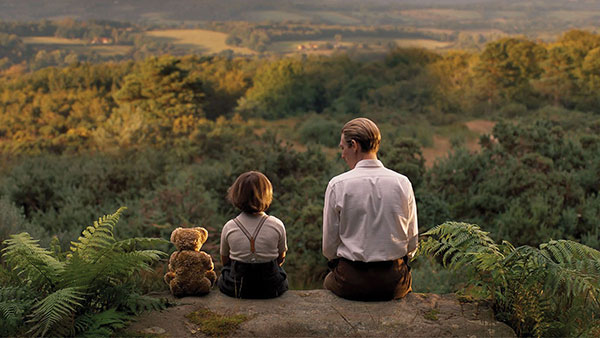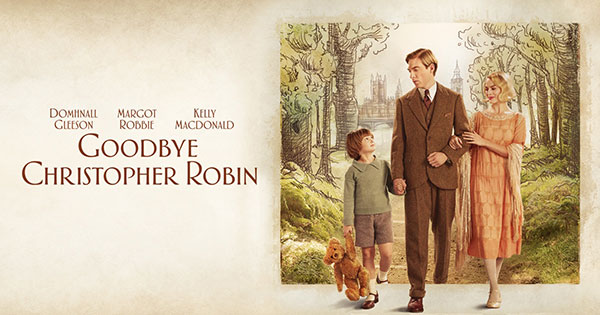I recently watched (on TV) Goodbye Christopher Robin, which tells the life story of the boy so key to Winnie-the-Pooh, by A.A. Milne. According to the movie, Pooh is the “most loved children’s book of all time.”
The depicted story of the boy’s life is a painful one. A.A. Milne, (Christopher’s father) played by Domhnall Gleeso, was a veteran of World War One, and suffered from PTSD syndrome, which caused him—a very successful West End playwright—to suffer debilitating war-induced flashbacks—to have a repressed emotional life—and a hard time being an engaged father.
Christopher’s mother (played by Margot Robbie) is depicted as selfish, exploitative of her son’s fame, and a snobbish upper-class lady.
The most consistent love in Christopher’s life comes from his Irish nanny (played by Kelly Macdonald)—who is dismissed when she objects to the way Christopher is mistreated.
The very young Christopher Robin is played, charmingly, by Will Tilston.
The movie suggests that the Pooh stories came to life when Christopher and his father enjoy a rare time alone together in rural England. Mother has left for London to enjoy the high life, while the nanny has gone away to take care of her dying mother. In other words, get rid of the women, and creativity happens.
But the essential story revealed here is the deep resentment Christopher felt as to how he was exploited, and cheated of parental love. As depicted, he spent much of his young adult life trying to get away from his literary persona.
What does the film tell us about Winnie-the-Pooh? Very little except to suggest how some of the book’s charming points came from some of the rare moments when father and son enjoyed time together.

What does the film tell us about children’s literature, or the writing life? Nothing.
What does the film tell us about early 20th Century British parenting? That it was pretty pathetic.
At the end of the movie we are told (via subtitles) that Christopher refused to take a penny of the massive money engendered by Pooh, that he always remained in contact with his former nanny, and that he created and ran a bookstore.
I liked that part.
But it also suggests that a book—however dependent on the realities of an author’s life—that life has little to do with how readers enjoy it. It is fascinating to think how little a writer has to do with the published book once it is the hands of readers.
Indeed, when it comes to books, it’s the readers who matter most.

4 thoughts on “<em>Goodbye Christopher Robin</em>”
A rather sad movie, it seems. I haven’t seen it yet. I always hope that the writers of beautiful, honorable children’s book are also beautiful of soul and honorable. Sadly, too often I have found it not so…still there are some who write as they are.
Dear Avi,
I’ve read your books since I was a little girl in elementary, just learning about what the world was and how to read. I’d like to say that I deeply appreciate all that you’ve written, that it’s helped shape who I am today, and that I will always carry your words around with me. I hope you don’t mind too much, for I think they are good words and I value them. Thank you for being here for so many people, including me.
Sincerely,
Amanda
I enjoyed the movie, gave me time to pause. Your comments have also given me time to reflect, Avi. Thank you.
I love your wise analysis and conclusion. Books live in readers’ minds. Without writers, this can’t happen. Louise Rosenblatt so wisely talked about this. A writer writes from their own voice and luckily sends it out into the world. Thank you, writers!